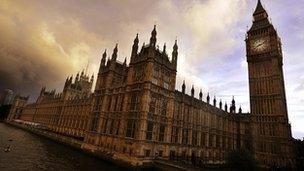Battle for the 1922 exposes Conservative frustrations and divisions
- Published

Many MPs are said to be bored and resentful of being told how to vote
Have you heard? Apparently the 301 are trying to take over the 1922?
And don't forget the 40, they are taking soundings, as are the 2020. The big question is have they got the 92 on the run?
If you have no idea what the previous three sentences mean, do not worry. You are not alone. They should be comprehensible only to the most assiduous Westminster watcher or the very strange.
So let me fill you in. All those numbers represent various groups of Conservative MPs, representing different factions, generations and parliamentary majorities in the House of Commons.
Numbers game
And they are all in play because on Wednesday Tory MPs go to the polls. Or at least the poll, singular, because there is only one polling station, committee room 14 in the Palace of Westminster.
MPs will troop in there to choose which backbenchers should sit on the executive of a body called the 1922 committee. This is a forum for Tory MPs to discuss issues and let the party leadership know what they are thinking.
Now, bear with me, if your eyelids are beginning to droop.
I will not trouble you with the names of who is standing, who is favoured and who is facing the chop. You can read that elsewhere. This is not "MPs have got talent" and there are no dogs involved.
But I would urge you to note that this election is taking place and that it matters for the following reasons:
<bold>1. The Conservative parliamentary party is highly divided. </bold>
Self-styled loyalist MPs from the new intake elected in 2010 - the so-called 301 - are trying to oust some of what they see as the disloyal old guard. The incumbents have been resisting hard, suspecting a Downing Street-inspired coup to take over a troublesome committee. Other MPs in the middle have been irritated at their disloyal colleagues criticising David Cameron. But they have been equally irritated at being told to back a slate of supposedly pro-leadership candidates. This has not been a happy campaign; tempers have frayed and relationships have been tested. Some MPs have resigned from the committee because they have just had enough. One veteran Conservative MP told me: "It reminds me of Maastricht. One group of critical MPs is holding out against the leadership. Another faction of loyalists bearing down on the rebels. Different tables in the tea rooms, rows in the corridors. It is getting very nasty."
<bold>2. This division suggests that David Cameron has a worsening discipline problem. </bold>
The irritable, unhappy, scratchy mood on the Conservative backbenches is getting worse. Many MPs are bored, they have little legislation to occupy them, they feel unloved by Downing Street. They don't like being told how to vote by MPs seen as ambassadors of Team Cameron. Even junior members of the government known as parliamentary private secretaries are resentful at being told who they should vote for. All of this will make it harder for the whips next time they ask MPs to vote for something they disagree with. Such as a minor, uncontroversial matter like House of Lords reform. As one Tory MP put it to me, "the PM is losing the benefit of the doubt. We are uncertain where our loyalties should lie". Any reshuffle will only add to this disillusionment, for it will dissatisfy more MPs than it will please.
<bold>3. This division reflects a more fundamental debate within the Conservative party about what it is for. </bold>
The MPs in the different factions do not appear to be driven by ideological differences. It is hard to say that one group is on the left and the other is on the right, or one is more eurosceptic than the other.
There is clearly a generational clash going on here, with the new intake of Tory MPs wanting to stake their claim, and older MPs wanting to protect the platform that allows their voice to be heard. But all the tensions and arguments that have dominated the corridors and tea rooms of Westminster in recent weeks have in practice boiled down to a debate about what the Conservative Party is for.
What is the role of the party within the coalition? Where is David Cameron leading them? Is he a traditional Conservative who has sold his soul to some dastardly liberals? Or is he a modernising progressive who has forgotten his green, Big Society credentials? Add to that the government's recent rocky performance, the lack of economic growth and the chaos unfolding in the eurozone, and you have some very worried Conservative MPs.
<bold>4. Whoever gets elected, the lasting impression on the public will be that the Tories are squabbling among themselves. </bold>
At a time of economic uncertainty, how will voters respond when they see the elected representatives of the majority governing party spending more time considering their own affairs rather than trying to sort out the country? Contrast this to the discipline that most Liberal Democrat MPs showed after their party suffered huge losses at the recent local elections. Factionalism and parties within parties rarely impress the electorate. So today's elections may seem like a little parlour game for the Westminster village. But in fact they present another significant headache for David Cameron. And he has one or two of those already.
- Published15 May 2012
- Published15 May 2012